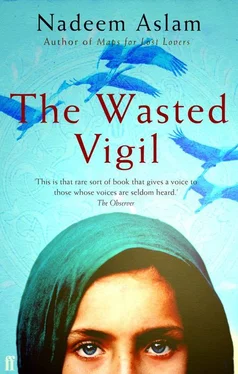Nadeem Aslam - The Wasted Vigil
Здесь есть возможность читать онлайн «Nadeem Aslam - The Wasted Vigil» весь текст электронной книги совершенно бесплатно (целиком полную версию без сокращений). В некоторых случаях можно слушать аудио, скачать через торрент в формате fb2 и присутствует краткое содержание. Год выпуска: 2009, Издательство: Faber and Faber, Жанр: Современная проза, на английском языке. Описание произведения, (предисловие) а так же отзывы посетителей доступны на портале библиотеки ЛибКат.
- Название:The Wasted Vigil
- Автор:
- Издательство:Faber and Faber
- Жанр:
- Год:2009
- ISBN:нет данных
- Рейтинг книги:4 / 5. Голосов: 1
-
Избранное:Добавить в избранное
- Отзывы:
-
Ваша оценка:
- 80
- 1
- 2
- 3
- 4
- 5
The Wasted Vigil: краткое содержание, описание и аннотация
Предлагаем к чтению аннотацию, описание, краткое содержание или предисловие (зависит от того, что написал сам автор книги «The Wasted Vigil»). Если вы не нашли необходимую информацию о книге — напишите в комментариях, мы постараемся отыскать её.
The Wasted Vigil — читать онлайн бесплатно полную книгу (весь текст) целиком
Ниже представлен текст книги, разбитый по страницам. Система сохранения места последней прочитанной страницы, позволяет с удобством читать онлайн бесплатно книгу «The Wasted Vigil», без необходимости каждый раз заново искать на чём Вы остановились. Поставьте закладку, и сможете в любой момент перейти на страницу, на которой закончили чтение.
Интервал:
Закладка:
The two men have come to a standstill now, their eyes fixed on her, but she continues towards them.
‘Lara,’ she hears David say. Not the voice in which he had told her that the bulbul’s silhouette resembles that of certain American birds, the cardinal and the waxwing. A sound as faint and dream-edged as a word uttered by someone during sleep.
*
Benedikt Petrovich lies on the ground, one eye looking up at the dark morning sky, the other shooting down into dust. The chill sensation of water has awoken him. Either the drops were sprinkled onto his face to rouse him, or it’s rain. He flexes his right arm to see if someone or something is near by and then lifts his head off the ground. The movement awakens the pain in his legs and he remembers now, memory too jolted awake, the blade descending onto the back of his ankles just before he lost consciousness. They had hamstrung him. He lowers his head after seeing the white curve of chalk drawn on the earth near him. With great pain he raises his head again and casts a glance towards his feet and sees that, for some reason, he is lying inside a circle drawn on a field. He tries to extract some answers from the confused haze in his mind. How has he ended up here in this field, how old is he, where is he? He remembers his own date of birth and that of his sister Lara. He recalls the day he received news that he had been conscripted, and remembers also the afternoon he learnt that he’d be sent to Afghanistan the following day. This is a photograph of me when I was younger, someone had said to him once — a new girl at school in Leningrad? A fellow soldier, met at some point here in Afghanistan? — and he had replied, Technically speaking all photographs are photographs of us when we were younger ha ha. And was it him or someone else who wrote this in a letter to a friend in the Soviet Union, Mitya, could I please borrow your parade uniform — we’ll only be given battle dress so where would we find the badges and other stuff? I hope you have had your teeth replaced by now. And tell Yuri to write to me. Everyone said they’ll write but no one does …
There is activity somewhere far away, shapes moving, people milling about, but from within his white circle he cannot bring the distance into focus. Seeing just that cracked earth, a grass blade or two dusted with the white powder which describes the line around him. Each of his ankles feels as though it is in a wolf’s jaw and he is unbearably cold and only now does he become aware of the sounds of agony issuing from his mouth.
Minutes after leaving the girl Zameen in the orchard, he had found himself staring at an Afghan dukhi, his eyes so fierce Benedikt didn’t at first notice the gun he was pointing at him. He raised his hands but the dukhi was unmoving and Benedikt told him in Russian that he was a defector. Sickeningly, he now saw other dukhi on either side of the one he faced, dozens of them, some of them holding lanterns. ‘I’ll convert to Islam if you wish, and I have Kalashnikovs for you,’ he told them across the few yards of pale darkness that separated them, emphasising the words ‘Islam’ and ‘Kalashnikovs’. He pointed the raised left hand backwards, the direction where the girl and the weapons were, and nodded over his shoulder. In the fragmented glimpse he caught of the orchard behind him he saw a line of other men. He turned around slowly — no reaction from the guns in front of him — and saw that there was an equal number of Afghan ghosts behind him, each with his gun drawn.
They were two small armies of about fifty each, weapons pointed at each other, and he stood in the middle. In one place to his left the adversaries were so close to each other their guns crossed. He could perhaps slip away — this battle, this vendetta, had nothing to do with him. But when he took a step sideways there was movement in the guns and a voice said something loudly. He froze, realising he was the prize the two sides wished to possess. The ghosts were talking now, shouting across him, hurling words at each other in obvious rage, pointing at him now and then. The standoff lasted until dawn arrived and then the two groups, still tense, seemed to come to some kind of agreement, wild laughter directed at him occasionally as he was led out of the orchard, the new sun and the uncovered sky making him blink. They had fastened his hands behind him with rope — so tight his collarbones hurt — and now and then they taunted him. Every time he slowed he was made to pick up his pace with a blow, a fist in the face or a rifle butt on the shoulders. ‘I’ll become a Muslim — a Mussalman. Benedikt Ahmed. Or Muhammad Benedikt,’ he told them more than once; but they brought him to a small room and he was imprisoned there, hearing the bolt drive home on the other side of the door.
What happened to Zameen? At the military base she had been chained up in a room like this one. Disgrace and mortification and dishonour had made him enter her room the first time, placing one hand over her mouth where she lay asleep and tearing at her clothing with the other. He and a group of other soldiers had earlier that day gone to the river that flowed beside the military base. They had driven their tank into the water to wash it. Human flesh was caught in the tracks from a week ago when a number of the inhabitants of a village, suspected of harbouring rebels, had been made to lie on the ground and had had the tank driven over them. The meat and bones were decomposing and the unbearable stench had meant that the tank had to be taken to the river. They used sticks to work loose the bits of clothing and bodies. A copper talisman one of the dead men had been wearing around his neck. And that was when they found a girl hiding among the reeds. She said she was from the village whose men had been crushed under the tank, her father and brother among them, and that she had followed the tank tracks towards the military base and had been hiding on the riverbank for five days, waiting. She wanted to collect as much of the remains as she could, to provide a grave for them.
The dead were dead, past caring, but last rites and ceremonies of burial were not for the dead — they were for the living. She was alive and had her responsibilities and her love. She was too weak to have protected them when they were living but could protect their flesh from lying exposed to the elements, to the beasts of day and night.
The girl, who was about fourteen years old, was lifted into the tank and the soldiers took turns brutalising her in there, Benedikt remaining outside to keep watch. When they told him it was his turn he wouldn’t climb in — and so they held her underwater and then let her float away. Her bangles could not be heard as she struggled inside the liquid, and the river had also silenced the sound of the gun, and then a fight broke out because the others jeered and began to laughingly speculate as to why Benedikt had refused, touching without knowing on the truth of his inexperience and his fears. In solitude he blushed, feeling wretched. The word had reached the colonel, who, as always, more and more drunk as the day advanced, had called Benedikt out and humiliated him before everyone.
Later that night, the memory of it made him enter the room where Zameen lay chained up.
Now, a prisoner himself, he hoped her ordeal was over, that she’d found safety.
At dawn the next day, three dukhi came into his cell and twice he heard the word buzkashi being spoken excitedly. It was the Afghan national sport, buzkashi, he knew. A dangerous and bloody game akin to fierce combat in which the body of a calf or goat was placed in a circle drawn in quicklime in the centre of a field, and the two opposing sides gathered near it on horseback. At a rifle shot, they all launched themselves upon the carcass. To win a point they had to pick it up, carry it to a predetermined turning point about a mile away, and bring it back to the circle without allowing any of the opposing players to wrench it from their grasp, the riders at times literally clinging to their mounts by their stirrups, whips clenched in teeth. The players had been known to number as many as one thousand and when the carcass got ripped apart, as often happened amid kicking hoofs and the slashing whips, the referee decided which team had control of the larger remnant.
Читать дальшеИнтервал:
Закладка:
Похожие книги на «The Wasted Vigil»
Представляем Вашему вниманию похожие книги на «The Wasted Vigil» списком для выбора. Мы отобрали схожую по названию и смыслу литературу в надежде предоставить читателям больше вариантов отыскать новые, интересные, ещё непрочитанные произведения.
Обсуждение, отзывы о книге «The Wasted Vigil» и просто собственные мнения читателей. Оставьте ваши комментарии, напишите, что Вы думаете о произведении, его смысле или главных героях. Укажите что конкретно понравилось, а что нет, и почему Вы так считаете.












